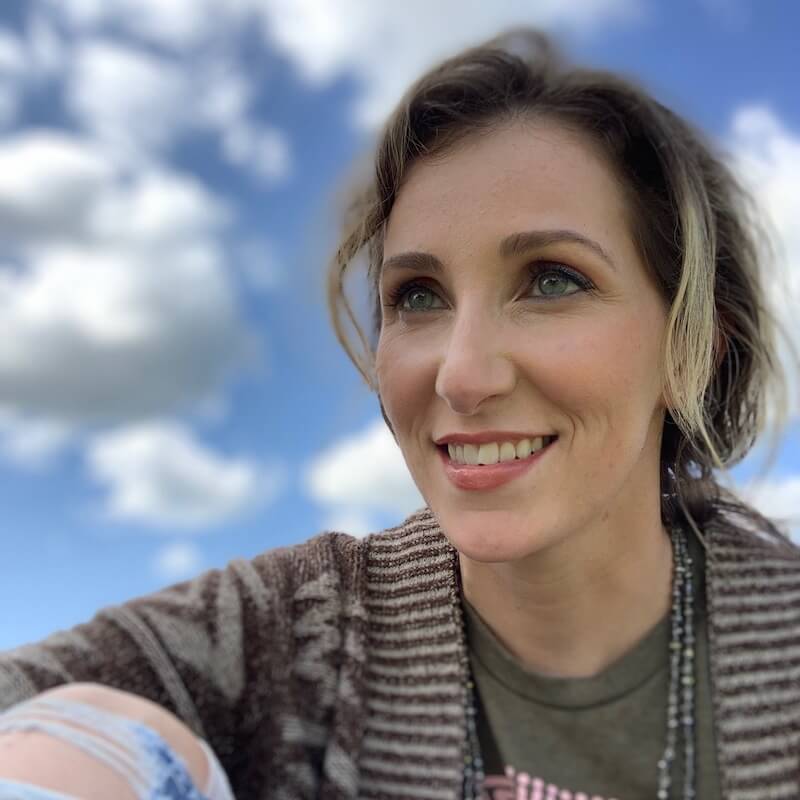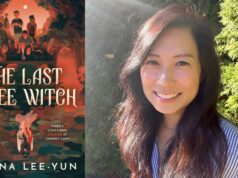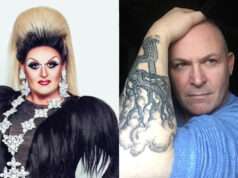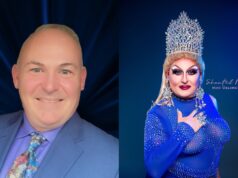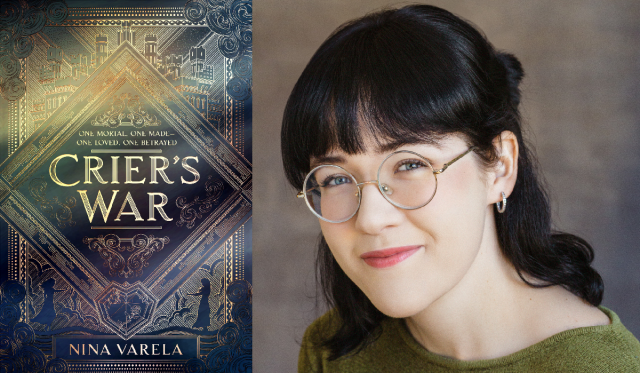

(Editor’s note: NonDoc’s Author Umbrella interviews up-and-coming writers, particularly authors of color, authors of disability and LGBTQ authors. The interviews have been transcribed and lightly edited for length and clarity.)
For this week’s Author Umbrella series, I interviewed Nina Varela, author of Crier’s War. Her debut young adult novel will be released by HarperTeen on Oct. 1, 2019.
About the author: She is a nationally awarded writer of screenplays and short fiction. Born in New Orleans and raised on a hippie commune in Durham, North Carolina, these days, she now lives in Los Angeles with her writing partner and their tiny, ill-behaved dog. She tends to write stories about hard-won love and young people toppling the monarchy/patriarchy/whatever-archy. On a related note, she’s queer. On a less related note, she has strong feelings about hushpuppies and loves a good jambalaya. Crier’s War is her first novel.
Before Varela’s interview, here is a synopsis of Crier’s War:
Crier’s War is a beautifully wrought fantasy that centers upon a world where androids have overtaken humanity in a system of Automae monarchy, a sort of Westworld meets Game of Thrones. Ayla vows revenge after the android king kills her family. Her plan of vengeance? Kill the king’s daughter, Lady Crier. But the more she learns about Crier, the more intrigued she becomes. In a story of enemies-to-lovers romance, an android princess and her human handmaiden navigate a world of growing unrest, pressures from a foreign queen, and an evil new leader on the rise. In the process, they discover only one path to love: war.
1) You’ve said before that you like “writing stories about lesbians toppling the monarchy.” What do you hope readers take away from the dynamics of Ayla and Crier’s relationship and the struggles they tackle along the way?
More than anything, I hope it’s a fun ride. This is book one of a duology; we’re not at the big meaningful ending yet. I just want readers to enjoy it.
I want queer readers to feel seen—to read this book about girls-who-like-girls getting caught up in the huge evil machinations of war, fighting to protect the people they love, learning more about themselves and the world around them, choosing their own destinies.
It’s not a particularly light book, it’s about loss and servitude and rebellion, but I hope the rebellion part sticks. Not just in a Let’s overthrow the government! kind of way, but also in the sense that for so many people, continuing to exist is an act of rebellion.
Existing loudly, existing with joy, existing with love and light and fury and sorrow and everything else, that’s rebellion. That’s what I want people to take away from this. (Let’s also overthrow the government, though.)
2) Your childhood is fascinating! Born in New Orleans, raised in a hippie commune in North Carolina where you played in the woods and made faerie houses from moss and bark. Did growing up in the South nurture your love of fantasy? How has it influenced your writing?
I grew up in lush green. We lived out in the woods, and I spent every minute of free time exploring and playing in the river and reading fairy tales, and I for sure believed faeries and magick and all that was real. I still do, to be honest.
I think it’s more fun to believe in things than not. And there’s something timeless about the woods—it was so easy to pretend I was an elf, or a witch, or a Girl With Insert Magic Power Here, and just let my imagination run wild. I never lost that fascination with fairy tales.
Also, the thing non-Southerners have to understand about the South is it’s not just white rednecks making laws for states full of white rednecks. It’s white supremacists taking control of state government through gerrymandering and voter suppression and then using that control to harm diverse communities.
I was lucky enough to grow up surrounded by people working to create a more equal South. Growing up in that environment shaped me, my beliefs, the kind of stories I want to tell.
I do believe good triumphs in the end; I do believe every unjust institution can be toppled; I do believe people are infinitely more powerful than kings. I want to tell stories about that—with a little magick thrown in.
3) In creating a sprawling fantasy like Crier’s War, which did you focus on first: world building or characters?
I’m very much a world building person. For me, the world creates the characters, not the other way around.
I had the vague idea of who Crier and Ayla were going to be—what was required for this plot, for this romance—but all the details of their backstories, their personalities, their dreams and desires, came from the world building.
For example, Crier was originally just going to be a sort of quiet, unassuming princess type. The bare bones of the story (“android princess, human servant”) required only that she be royal-adjacent and in a position of power over Ayla.
It was in writing the politics of this world that Crier’s own politics began to take shape, and she became this nerdy, idealistic, essay-writing force of social change. I like her much better this way.
4) What was your favorite aspect of the writing process in creating Crier’s War?
The relationship between Crier and Ayla. I loved writing that slow-burn romance—especially as this book is in dual point of view, so the whole time we’re switching back and forth between the two girls’ perspectives.
I had so much fun playing the unreliable narrator. Like, having both girls experience or think about the same moment but have totally different reactions and interpretations of what happened. (Crier: “She walked away because she hates me.” Ayla: “I walked away because I couldn’t stop myself from smiling at her.”) It was so satisfying.
I also loved writing all the tiny details of world building that aren’t relevant until you’re actually in the thick of it, on the page, like what the characters are eating and wearing and reading in any given scene.
I love getting super specific with those details… even if it means I end up in a six-hour research spiral because suddenly I have to know everything about, like, medieval fruit preservation.
5) On Twitter, you are candid about your love of good ole southern comfort food. What is your go-to dish when things get stressful during the publication process?
this new orleans baby made some beignets! pic.twitter.com/Ekgoedjnth
— nina 🌈 CRIER’S WAR OCT 1st! (@ninavarelas) July 29, 2019
I have a huge sweet tooth, so I just bake sweet things when I get stressed. Banana bread, coffee cake, any kind of pie, etc. I made beignets the other day and they were so dang good.
But if I’m going to be cooking something, my ultimate comfort food would be my dad’s red beans and rice with andouille sausage. He’d always serve it up with bananas or fried plantains on the side.
If I’m feeling lazy: biscuits with bacon and honey-butter. You can’t go wrong.
6) On the day of Crier’s War’s release, Oct. 1, what do you plan to do to celebrate?
<⌒/ヽ-、___
/<_/____/
 ̄ ̄ ̄ ̄ ̄ ̄ ̄∧_∧ one week until
( ・ω・) CRIER’S WAR
_| ⊃/(___
/ └-(____/
 ̄ ̄ ̄ ̄ ̄ ̄ ̄— Crier’s War (@crierswarbot) September 23, 2019
I’m about to reveal how boring I am. I think I’ll probably call in sick to work and spend most of the day hanging out with my friends, possibly making a cake—or, oooh, making my friends buy me a cake—and hiding from social media. I know I’ll be freaking out the whole day, so I’ll just be doing chill, quiet things. My launch party isn’t until the fifth, so I’ll have a few days to hibernate before I come crawling out into the big wide world.
7) How do you think Crier’s War might appeal to Oklahoma City readers?
I think the major themes—loss, queerness, revolution, falling in love and wishing you hadn’t, wanting to make the world a better place—are universal. I hope readers from anywhere will be able to find themselves in this book, or at least find a story and characters they want to see through to the end.
Maybe someday I’ll be able to come through OKC and find out. (I hear I should keep an eye out for fried pies, chicken fried steak, and frybread Choctaw-style. All that fried goodness…whew! I’m sold.)
Crier’s War can be preordered at PreOrderCriersWar.com.









